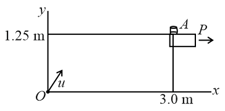Projectile Motion
Projectile Motion: Overview
This topic covers concepts such as Projectile Motion, Vertical Motion, Projectile Motion from a Horizontal Plane, Horizontal Projectile Motion from a Height, Oblique Projectile Motion from a Height, and Time to Reach Maximum Height of a Projectile.
Important Questions on Projectile Motion
A ball is projected at an angle of above with the horizontal from the top of a tower and strikes the ground in at angle of with the horizontal. Find the height of the tower and the speed with which it was projected.
A particle is projected in x-y plane with y-axis along vertical, the point of projection being origin. The equation of projectile is . The angle of projectile is ---------------------- and initial velocity is -----------------------------------
A rifle with a muzzle velocity of shoots a bullet at a small target away in the same horizontal line. How high above the target must the gun be aimed so that the bullet will hit the target?
Two bodies of same mass are projected with the same velocity at an angle and respectively. The ratio of their horizontal ranges will be
The maximum range of a gun of horizontal terrain is . If then, muzzle velocity of a shell must be
From a high building, a stone is dropped and simultaneously another identical stone is thrown horizontally with an initial speed of Which one of the following statements is true?
An object is kept fixed at the point and on a plank raised above the ground. At time the plank starts moving along the direction with an acceleration At the same instant a stone is projected from the origin with a velocity as shown. A stationary person on the ground observes the stone hitting the object during its downward motion at an angle of to the horizontal. All the motions are in the plane. Find and the time after which the stone hits the object. Take

Two guns situated on the top of a hill of height fire one shot each with the same speed at some interval of time. One gun fires horizontally and other fires upwards at an angle of with the horizontal. The shots collide in air at point . Find the time interval between the firings.
A projectile can have the same range for two angles of projection. If and be the times of flights in the two cases, then the product of the two time of flights is proportional to –
A projectile can have the same range ‘R’ for two angles of projection. If ‘t1’ and ‘t2’ be the times of flight in the two cases, then the product of the two times of flight is proportional to
A boy playing on the roof of a 10 m high building throws a ball with a speed of at an angle of with the horizontal. How far from the throwing point will the ball be at the height of 10 m from the ground? [Take g = 10 ms-2]
A nozzle is situated at a distance of above the ground level and is pointed up at angle of degrees to the horizontal. The diameter of the nozzle is and the jet of water from the nozzle strikes the ground at a horizontal distance of . Select the correct statement(s).
A stone is projected with a velocity of at to the horizontal. At any instant, the angles of elevation of the stone from the two extremities of the range are and . Then equals:
Two bullets are fired horizontally with different velocities from the same height. Which one will reach the ground first?
It is given that a projectile is fired horizontally with a velocity of from the top of a mountain high. Calculate the velocity of the projectile by which it strikes the ground.
A projectile has a maximum range of . Neglecting air resistance, what is the maximum height attained by it?
The time of flight of projectile is second and its range is The maximum height reached by it is
A cricket ball is thrown with kinetic energy at an angle with the horizontal. Its kinetic energy at the highest point will be
From the top of a tower high, a ball is thrown horizontally. If the line joining the point of projection to the point where it hits the ground makes an angle of with the horizontal, then the initial velocity of the ball is
A bullet is fired with a velocity making an angle of with the horizontal plane. The horizontal component of the velocity of the bullet when it reaches the maximum height is
